2011 江西中小学教师招聘考试高中英语真题及答案
第一部分 客观题
Ⅰ. Vocabulary(Questions 1 to 10)
Directions:In this section,there are 10 sentences.Beneath each of the sentence,
there are 4 choices marked A,B,C and D. Choose the ONE that best matches the meaning
of the underlined word. Then marked the corresponding letter on the Answer Sheet
with a single line through the centre.
1.“I really think there must be something rather fishy somewhere,don
t you?”
A. smelling of fish
C. suspicious
D. delicious
B. tasting of fish
2.It is imperative for the Chairman to look into this master personally.
A. necessary
C. useful
B. urgent
D. impossible
3.John boasted that he could finish the job all by himself in no time.
A. very rapidly
C. on time
B. in time
D. at any moment
4.The gift was from an anonymous person.
A. ignored
C. unrewarded
B. unremembered
named
D. un
5.When they asked me to make a speech,I was at a loss for words.
A. elated
C. surprised
B. dumb
D. tongue
tied
6.The clerk had to break off the conversation in order to wait on a customer.
A. continue
C. hurry D. begin
B. stop
7.It seems that concentrations of salt cause changes in the colour of sea water.
A. fluctuations
B. deviation
C. modifications D. variations
8.The manufactures hoped that the motor show would boost their car sales.
A. add
C. lift D. prompt
B. promote
9.They met to consider the drawbacks in the proposal.
A. misgivings
C. probabilities D. details
B. shortcomings
10. The salesman approached the house cautiously because of the vicious dog.
A. nervously
C. carefully
Ⅱ. Best choice for grammar(Questions 11 to 30)
B. bravely
D. deliberately
Directions: In this section, there are 20 incomplete sentences. For each sentence,
there are 4 choices marked A, B,C and D. Choose the ONE that best completes the
sentence. Then marked the corresponding letter on the Answer Sheet with a single
line through the centre.
�
11. —I wonder if I could read your autobiography.
—No problem, the moment Iit.
A.
C.
finish
will finish
B.
D.
finished
have finished
12. He is taking the situation too seriously. Actually, it is notbad for he still
has time.
A.
C.
much
that
B.
D.
very
rather
13. —Excuse me, any bank around here?
—Oh, look, there isover there next to the bus stop.
A.
C.
that
it
another
one
B.
D.
14. —It took them more than half an hour to work out the chemistry problem.
—Really? Itbe an easy one.
A.
B.
C.
can
mustn
D.
t
t
t
needn
t
won
15. Only after I lived abroad for a long timedifferent cultures so strongly.
A.
C.
I realize
did I realize
B.
D.
I realized
had I realized
16. —What do you think of the girl
s dancing?
—I
A.
C.
ve never seen a person withsense of art.
the better
a good
B.
a better
D.
the best
17. It is widely believed that it isrespects others that will be respected.
A.
C.
anyone
whoever
B.
the person
D.
who
18. —What made Tom so upset?
—to attend the lecture.
A.
C.
Having not been allowed
Because of not having allowed
B.
Not having allowed
Not having been allowed
19. We should pay great attention to road safety because of the frequent reports
about the accidents drivers and passengers got injured or killed in.
D.
A.
C.
which
in which
B.
where
D.
what
20. Trust me not at allall in all.
A.
C.
while
or
B.
but
D.
and
21. —We didn
t find John at the meeting.
—Heabout there being a lecture the following day.
A.
C.
didn t tell
told
had not been told
had not told
B.
D.
22. —Kindergarten kids will surely benefit a lot from this creative program.
—Exactly, we are looking forward to seeing itsoon.
A.
carrying out
carried out
B.
�
C.
to carry out
D.
to be carried out
23. —Could you tell me the way to Edward Clinic?
—Sorry, but I
A.
m afraid there is notEdward Clinic nearby.
B.
the
C.
a
D.
an
t think I
ll need any money but I
ll bring some .
/
24. I don
A.
C.
at last
once again
B.
in case
D.
in time
25. As soon as the gate opened,.
A.
B.
C.
D.
we found that the two men emerged
the two men had emerged
here the two men emerged
the two men emerged
26. He works too hard. That isis wrong with him.
A.
C.
why
the thing what
B.
what
D.
all
27. —Do you have a car?
—No, but I wish I.
A.
C.
have
do
B.
did
D.
have had
28. —Do you mind if I close the window? It
s a bit cold outside.
—.
A.
C.
Let me see
Yes, that
ll be better
D.
Yes, go ahead
B.
No, why not
29. It is widely concerned that this kind of species arerapidly.
A.
C.
dying out
dying away
B.
dying down
D.
dying back
30. Guys, hurry up. I
m afraid you won
t have time tobefore the party.
get changed
get changing
A.
C.
Ⅲ. Cloze(Questions 31 to 50)
D.
B.
get change
get to change
Directions: Read the following passage, this passage has 20 blanks. For each blank
there are 4 choices marked A, B,C and D.
Choose the ONE answer that best fits into
the passage . Then marked the corresponding letter on the Answer Sheet with a single
line through the centre.
Teachers need to be aware of the emotional, intellectual, and physical changes
that young adults experience. And they also need to give serious31to how they can
be best32such changes. Growing bodies need movement and33, but not just in ways that
emphasize competition. 34 they are adjusting to their new bodies and a whole host
of new intellectual and emotional challenges, teenagers are especially self
conscious and need the35that comes from achieving success and knowing that their
accomplishments are36by others. However, the typical teenage lifestyle is already
filled with so much competition that it would be37to plan activities in which there
are more winners than losers,38, publishing newsletters with many student
written
book reviews, 39student artwork, and sponsoring book discussion clubs. A variety
�
of small clubs can provide40 opportunities for leadership, as well as for practice
in successful41dynamics. Making friends is extremely important to teenagers, and
many shy students need the42of some kind of organization with a supportive
adult43visible in the background.
D.
D.
B.
B.
D.
B.
D.
D.
advice
B.
admired
B.
accommodate
enhance
nutrition
leisure
Although
Because
guidance
tolerance
In these activities, it is important to remember that the young teens
have44attention spans. A variety of activities should be organized45participants
can remain active as long as they want and then go on to46else without feeling guilty
and without letting the other participants47. This does not mean that adults must
accept irresponsibility.48they can help students acquire a sense of commitment
by49for roles that are within their50and their attention spans and by having clearly
stated rules.
31. A.
C.
32. A.
C.
33. A.
C.
34. A.
C.
35. A.
C.
36. A.
C.
37. A.
C.
38. A.
C.
39. A.
C.
40. A.
C.
41. A.
C.
42. A.
C.
43. A.
C.
44. A.
C.
45. A.
C.
46. A.
C.
47. A.
thought
opinion
strengthen
stimulate
care
exercise
If
Whereas
assistance
confidence
claimed
ignored
improper
fair
in effect
for example
displaying
creating
durable
surplus
group
personnel
consent
admission
particularly
definitely
similar
different
if only
so that
everything
nothing
off
short
now that
even if
anything
something
wise
as a result
in a sense
insurance
security
barely
multiple
individual
D.
B.
D.
B.
D.
D.
corporation
D.
exchanging
D.
surpassed
D.
B.
D.
B.
excessive
B.
describing
D.
rarely
B.
risky
B.
down
B.
long
B.
idea
D.
B.
B.
D.
B.
�
D.
B.
alone
On the average
D.
out
On the contrary
On the whole
making
planning
capability
proficiency
C.
48. A.
C.
49. A.
C.
50. A.
C.
Ⅳ. Reading comprehension (Questions 51 to 60)
On the other hand
B.
standing
taking
responsibility
efficiency
D.
B.
D.
Directions: In this section, there are 3 passages. Each passage is followed by some
questions or unfinished statements. For each of them,
there are 4 choices marked
You should choose the best answer. Then marked the corresponding
A, B,C and D.
letter on the Answer Sheet with a single line through the centre.
A
When I was at the age of 16, I met a common boy who would make jokes at you and
then you would run after him and his guys and beat them up. After that first meeting,
we kept on meeting and beating each other up at the fence. We would meet at the fence
all the time and we were always together. I would tell him all my secrets. I found
him easy to talk to and I could talk to him about everything.
In school we had separate friends. One day I told him that a guy I liked hurt
me and broke my heart. He just comforted me and said everything would be okay. He
gave me words of encouragement and helped me get over him. I was happy and thought
of him as a real friend. But I knew that there was something else about him that
I liked. I thought of it that night and figured it was just a kind of friend that
I was feeling. All through high school and even through graduation, we
re always
together and of course I thought of it as being friends. But I knew deep inside that
I really felt it differently.
On graduation night, even though we had different dates to the dance, I wanted
to be with him. That night after everybody went home, I went to his house and wanted
to tell him that I wanted to see him. Well, that night was my big chance and all
I did was just sit there with him watching the stars and talking about what I was
going to do and what he was going to do. I looked into his eyes and listened to him
talk about what his dream was, and how he wanted to get married and settle down.
He said how he wanted to be rich and successful. All I could do was to tell him my
dream and sit next to him. I went home hurting because I didn
t tell him how I was
feeling.
51. From Paragraph 2, we can learn the following are the boy s advantages but.
A.
B.
C.
D.
communicating with others
understanding others
giving girls better impression
comforting others
52. The author tells the story in a way of.
A.
anger
B.
regret
�
C.
excitement
D.
anxiety
53. The author felt hurt on graduation night because.
A.
B.
C.
D.
they would have no opportunity to meet again
she failed to express her true feeling
the boy understood her
she got poor grades in her study
B
Sunday, October 5
Clear, 69
My wife, Eleanor, and I took the train from Paris to Strasbourg, where we were
met by our driver and guide, and the minibus which goes along with the boat. We stopped
off in Barn for an hour on the way. Then we were taken to Nancy where the boat was
kept.
After the other passengers arrived, we had our first dinner on the boat. After
dinner we walked into downtown Nancy, a village with a large square and wooden houses.
Monday, October 6
Rained last night, cloudy in the morning, 69
We spent about two hours in Nancy, then sailed on the Canal de la Marne au Rhine.
Kind of a lazy day, eating breakfast, lunch, and dinner. After dinner we watched
a tape on Baccarat, where we will visit tomorrow.
It was pleasant to sit out on deck and watch the scenery go by at about 3 mph.
Tuesday, October 7
Light rain, 64
This morning we drove over to Baccarat and toured its museum and the church,
which has this unbelievable lamp that is going on a world tour the next day. We did
lots of shopping, then walked across the bridge to see a very, very modem Catholic
church with special Baccarat windows.
We drove to the top of the Voges Mountains and started down the eastern side.
Later we drove to Sorrenbourg to see the 13th century church at the Cordeliers. It
contains the largest window by Marc Chagall
Wednesday, October 8
Cloudy, 65
24 feet wide by 40 feet high.
Today we sailed from Schneckenbush to Saveme. We went through two caves, an
extremely unusual part of the journey. This river scenery is very different. We were
in a mountain valley with grassland on one side and a forest beginning to show some
color on the other.
Thursday, October 9
Cloudy, 66
Our dependable minibus was waiting to load the luggage and take us to the hotel
where everyone went their separate ways. Our boating days are over until next time.
54. Where did the author get off the train?
A.
Paris.
B.
Strasbourg.
�
C.
Nancy.
D.
Barn.
55. On which days did the tourists spend most of their time on the boat?
A.
B.
C.
D.
Monday and Tuesday.
Tuesday and Wednesday.
Wednesday and Thursday.
Monday and Wednesday.
56. From the text, we learn that Baccarat and Sorrenbourg are the names of .
A.
C.
towns.
museums.
B.
churches.
D.
mountains.
57. What does the author think of the tour?
A.
C.
Tiring.
Enjoyable.
B.
Expensive.
D.
Quick.
C
t be said to show the baby
Language learning begins with listening. Children are greatly different in the
amount of listening they do before they start speaking, and later starters are often
long listeners. Most children will “obey” spoken instructions some time before
they can speak, though the word “obey” is hardly accurate as a description of the
eager and delighted cooperation usually shown by the child. Before they can speak,
many children will also ask questions by gesture and by making questioning noises.
Any attempt to study the development from the noises babies make to their first
spoken words leads to considerable difficulties. It is agreed that they enjoy making
noises, and that during the first few months one or two noises sort themselves as
particularly expressive as delight, pain, friendliness, and so on.But since these
can
s intention to communicate, they can hardly be
regarded as early forms of language. It is agreed, too, that from about three months
they play with sounds for enjoyment, and that by six months they are able to add
new words to their store. This self imitation leads on to deliberate imitation of
sounds made or words spoken to them by other people. The problem then arises as to
the point at which one can say that these imitations can be considered as speech.
It is a problem we need to get out teeth into. The meaning of a word depends
on what a word depends on what a particular person means by it in a particular
situation; and it is clear that what a child means by a word will change as he gains
more experience of the world. Thus the use at seven months of “mama” as a greeting
for his mother cannot be dismissed as a meaningless sound simply because he also
uses it at another times for his father, his dog, or anything else he likes. Playful
and meaningless imitation of what other people say continues after the child has
begun to speak for himself. I doubt, however whether anything is gained when parents
take advantage of this ability in an attempt to teach new sounds.
58. Before children start speaking,.
A.
B.
C.
they need equal amount of listening
they need different amounts of listening
they are all eager to cooperate with the adults by obey spoken instructions
�
D.
they can t understand and obey the adult
s oral instructions
59. Children who start speaking late.
A.
B.
C.
D.
may have problems with their listening
probably do not hear enough language spoken around them
usually pay close attention to what they hear
often take a long time in learning to listen properly
60. A baby
s first noises are.
A.
B.
C.
D.
an expression of his moods and feelings
an early form of language
a sign that he means to tell you something
an imitation of the speech of adults
第二部分 主观题
Ⅰ. True or false(5 points, each 1 point)
1.普通高中英语课程的性质是:高中生学习外语,一方面可以促进心智、情感、态度与
价值观的发展和综合人文素养的提高;另一方面掌握一门国际通用语种可以为学习外国先进
的文化、科学、技术和进行国际交往创造条件。
2.高中英语课程采用必修课与选修课相结合的课程设置模式。必修课程共 10 个学分,
按模块顺序开设。学生修满 10 个必修学分,达到七级目标要求及达到英语学科的高考要求。
3.高中英语课程的目标按级别分共有四级,即六至九级。
4.在外语教育测量中,评价者在对一份试卷的质量作分析时,通常从效度、信度、难度
和区分度去衡量其质量。
5.英语学习策略主要包括调控策略、交际策略和资源策略。
Ⅱ. Fill in the blanks(10 points,each blank 0.5 point)
1.高中英语语言基础知识包括、、、、等五个方面。
2.在外语教学理论中,这些概念的中文意思是 Lingua Franca、Mentalism、LAD、
Declarative Knowledge。
3.自实施《普通高中英语课程标准(实验稿)》以来,高中英语教材的单元编写是按照话
题、、和任务的思路设计的。
4.从考试成绩判别标准的角度看,外语教育测试一般分为常模参照性测试、及三种;从
测试的目的分,可分为潜能测试、、、和结业性测试五种。
5.在我国一百五十多年的外语教学中,出现了各种外语教学法流派,请写出其中的四种
教学法:、、和。
Ⅲ. Writing(10 points)
请以“How to Give a Good English Class to Your Senior Students”为题写一篇短
文。
下:
要求:
1.字数不少于 150 字;
2.内容要点至少包括四个方面。
Ⅳ. Teaching plan(15 points)
请根据以下教学内容给高二下学期的学生设计一个课时(40 分钟)的写作教学课教案。
假如你是李华,你在 QQ 上留言邀请蓝天大学的朋友 Peter 参加你的生日晚会,要点如
�
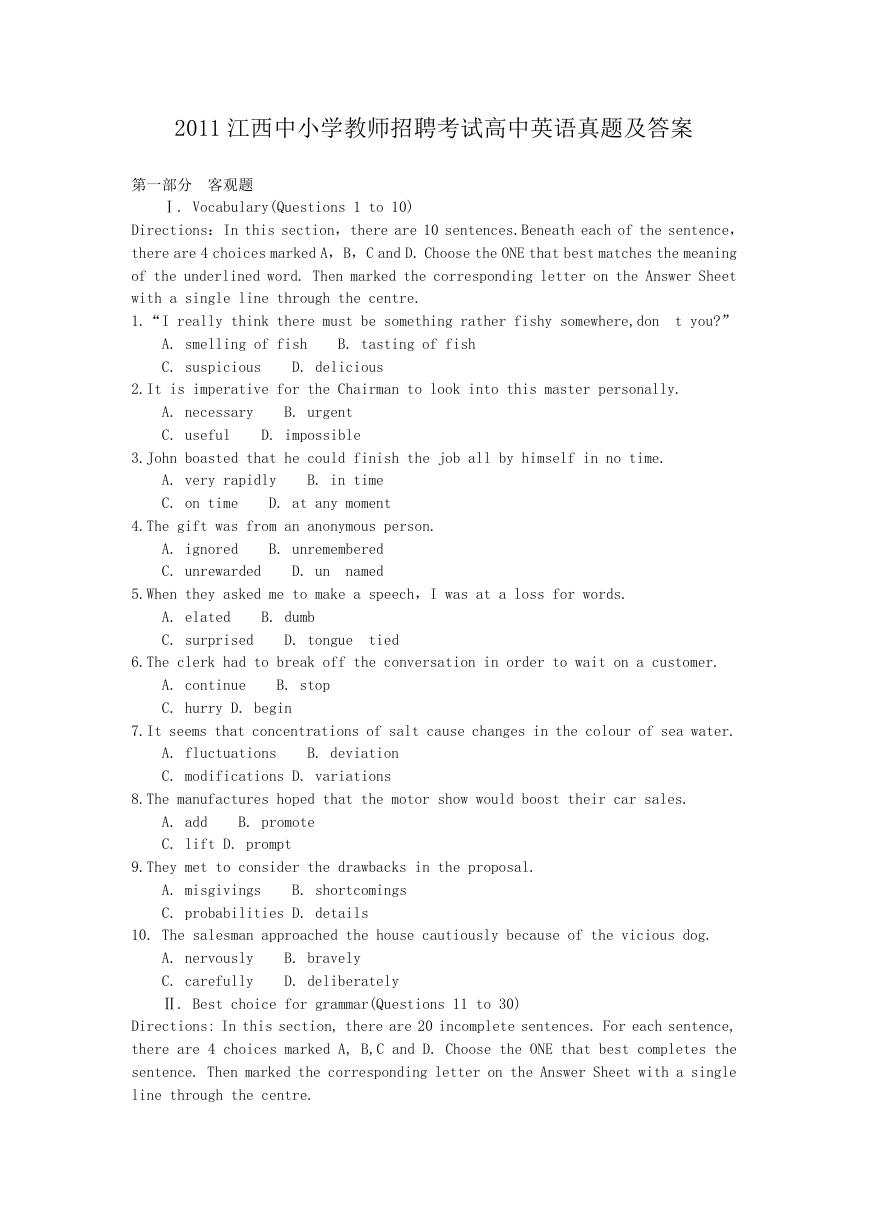
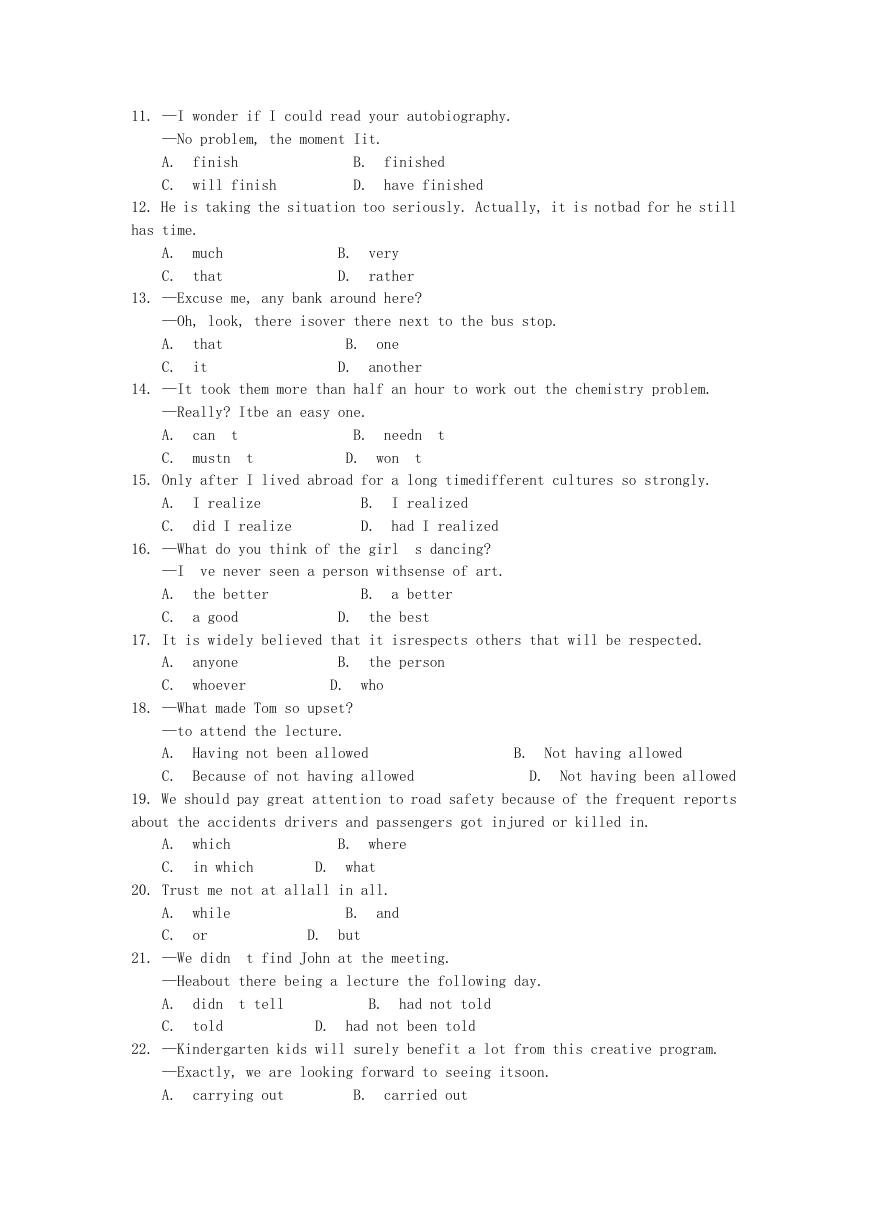
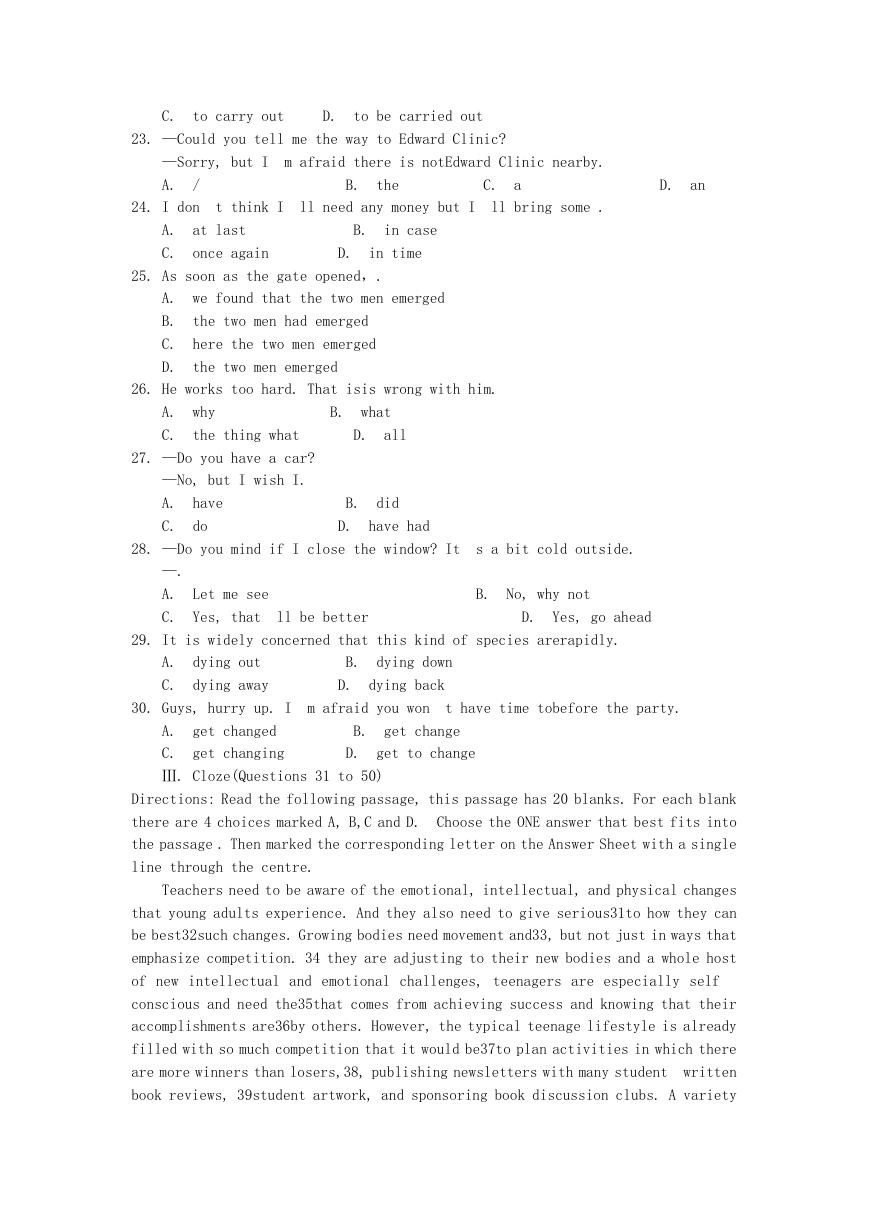
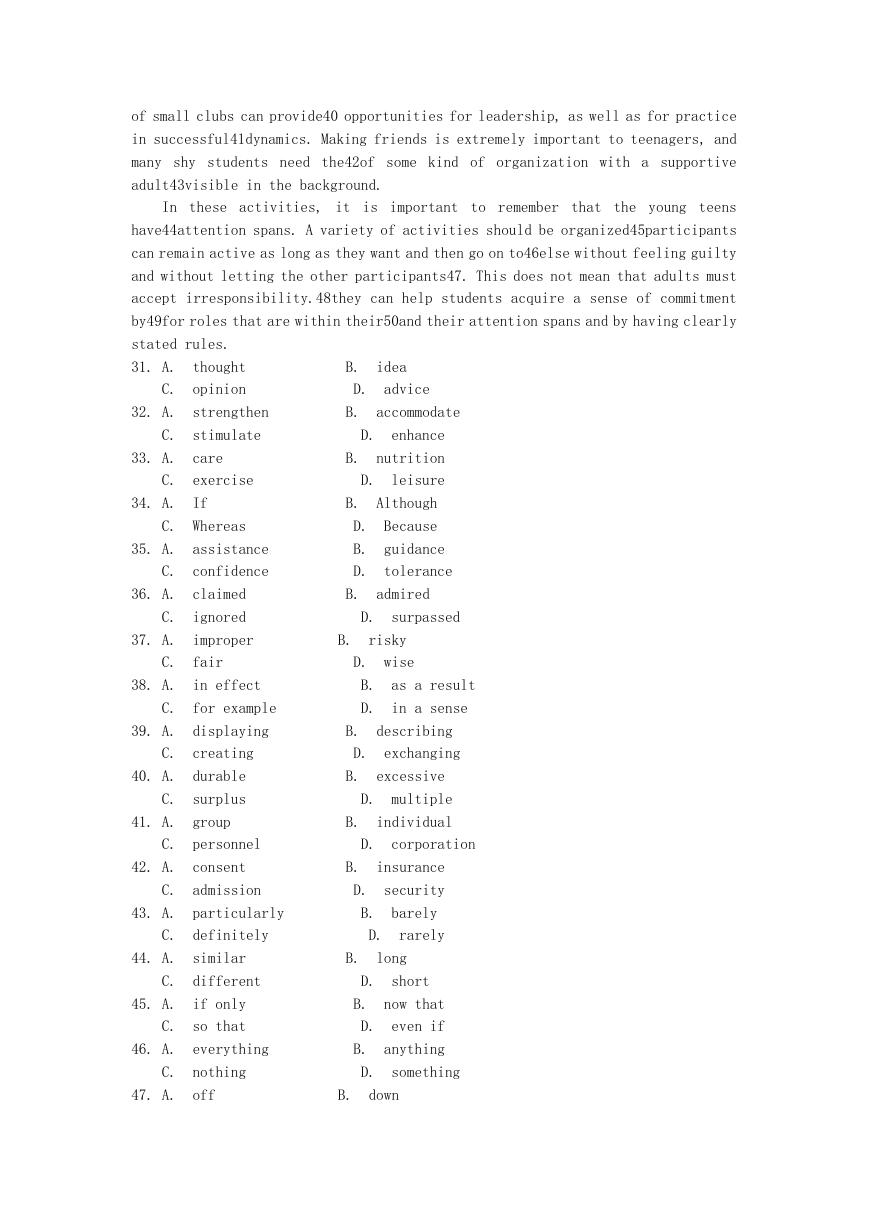
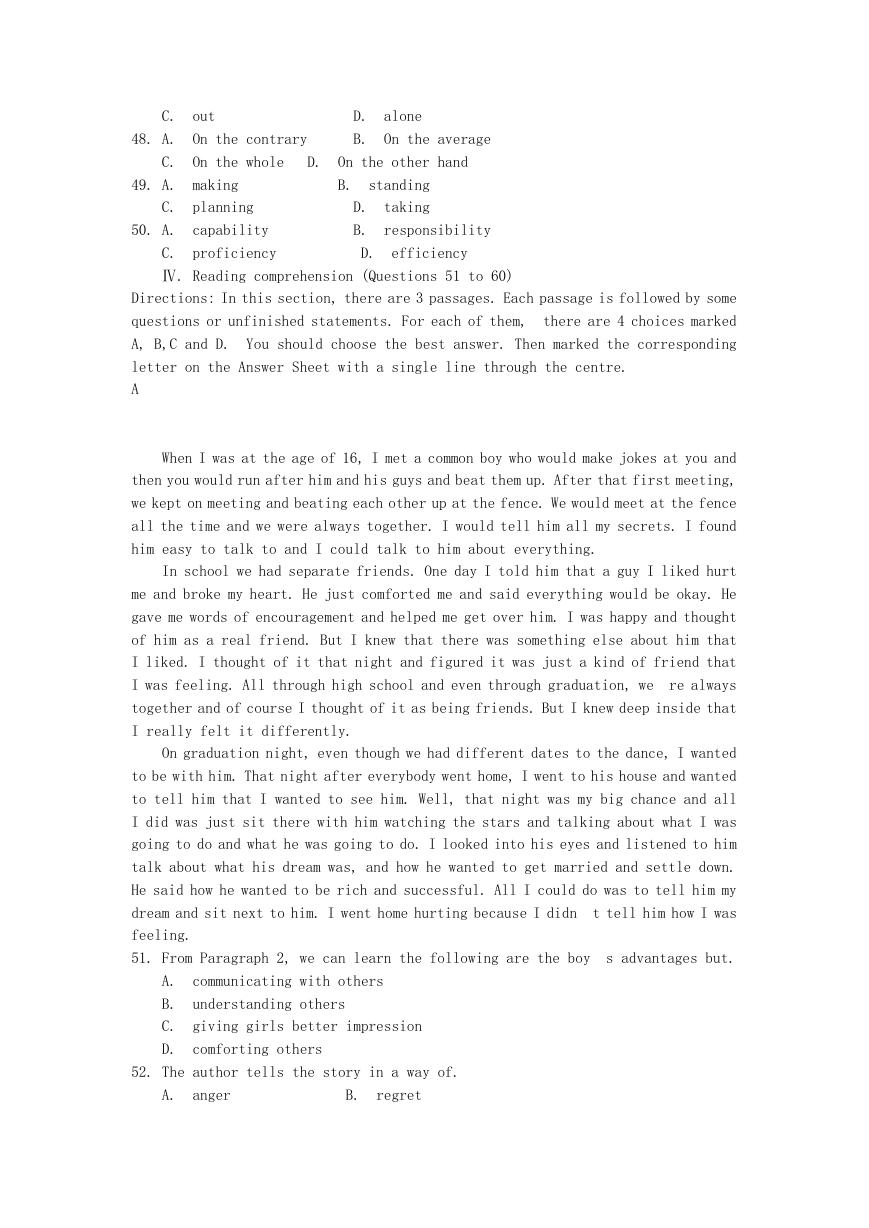
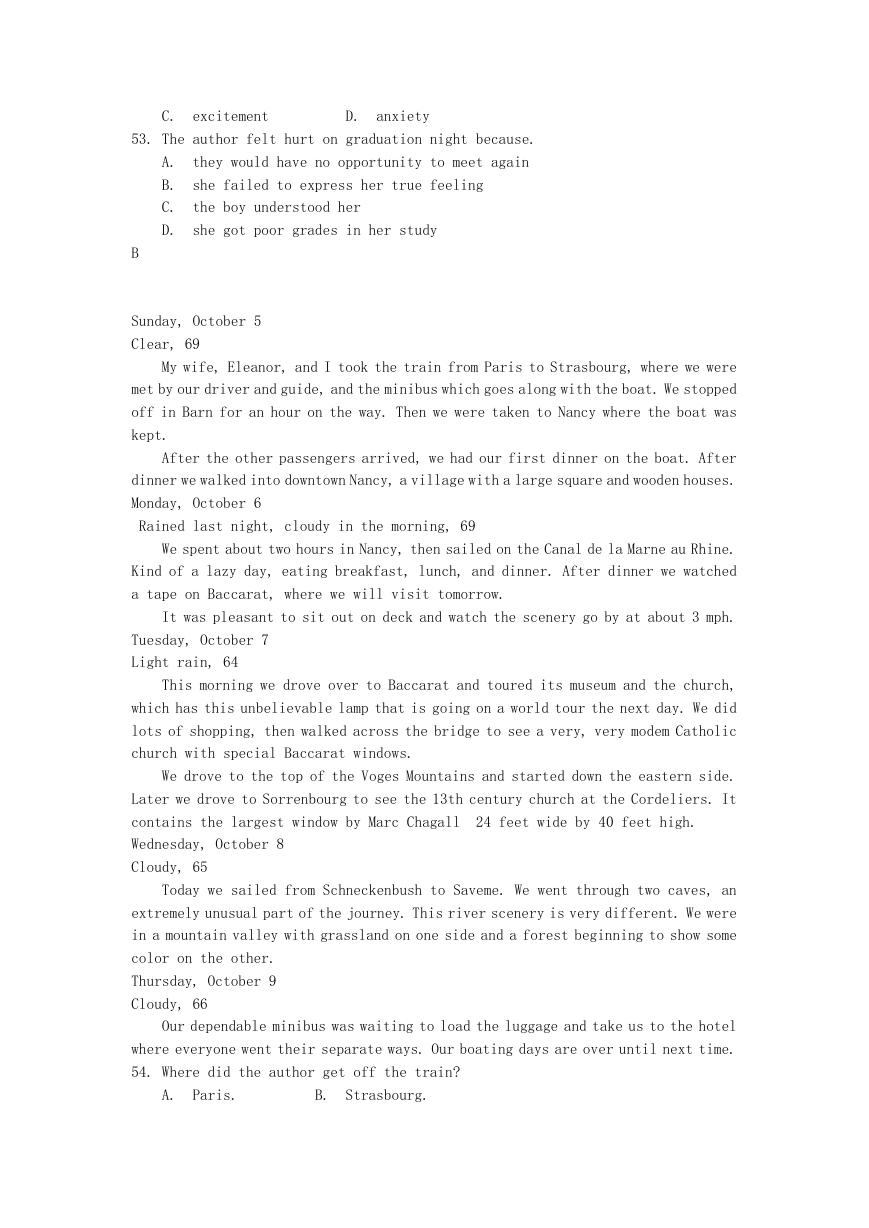
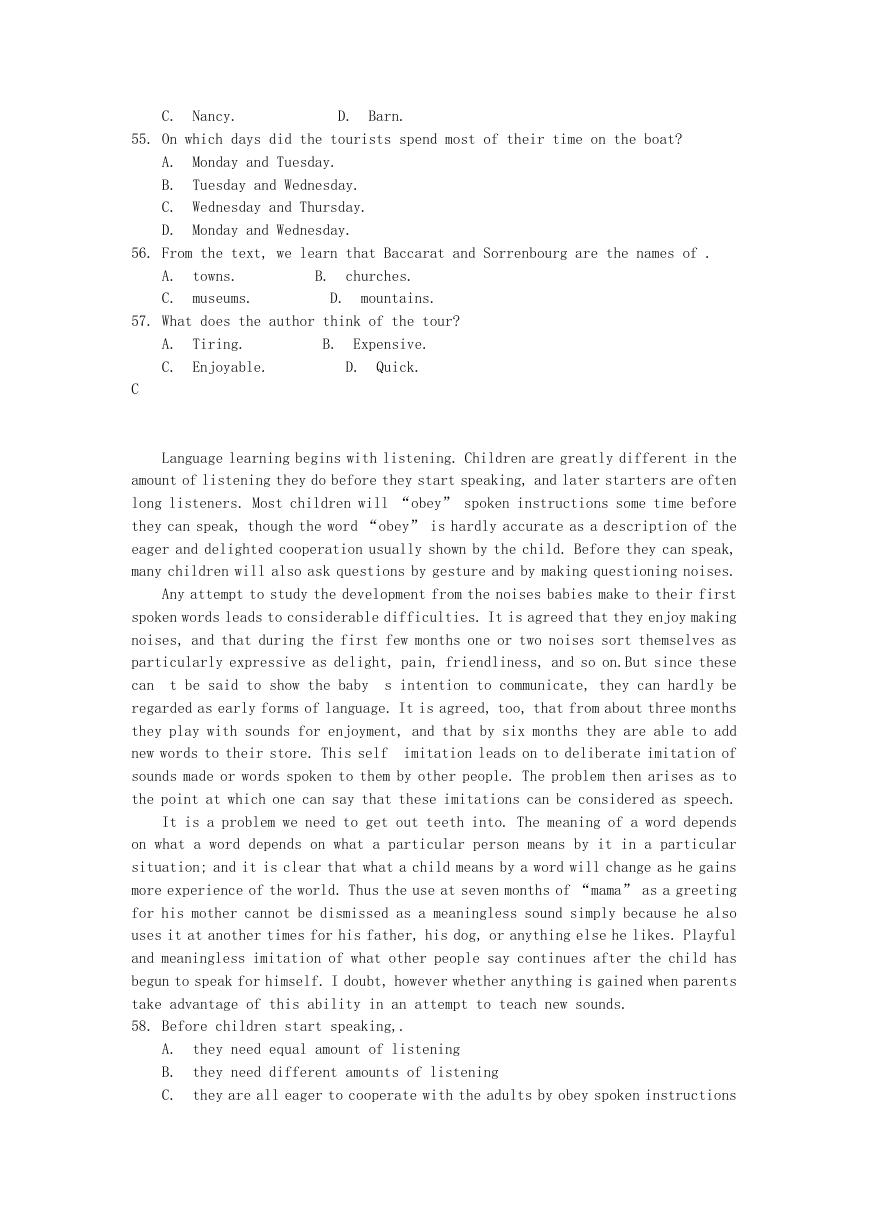
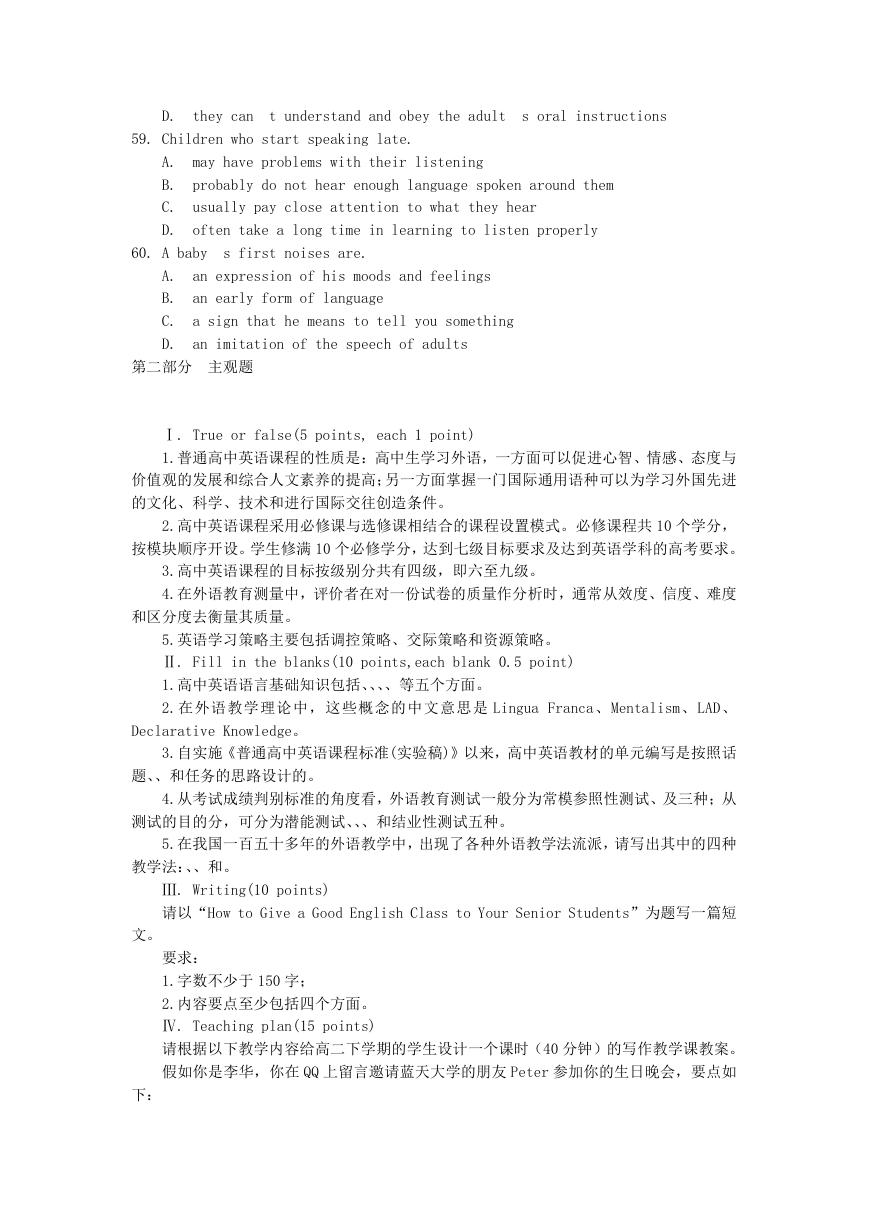








 2023年江西萍乡中考道德与法治真题及答案.doc
2023年江西萍乡中考道德与法治真题及答案.doc 2012年重庆南川中考生物真题及答案.doc
2012年重庆南川中考生物真题及答案.doc 2013年江西师范大学地理学综合及文艺理论基础考研真题.doc
2013年江西师范大学地理学综合及文艺理论基础考研真题.doc 2020年四川甘孜小升初语文真题及答案I卷.doc
2020年四川甘孜小升初语文真题及答案I卷.doc 2020年注册岩土工程师专业基础考试真题及答案.doc
2020年注册岩土工程师专业基础考试真题及答案.doc 2023-2024学年福建省厦门市九年级上学期数学月考试题及答案.doc
2023-2024学年福建省厦门市九年级上学期数学月考试题及答案.doc 2021-2022学年辽宁省沈阳市大东区九年级上学期语文期末试题及答案.doc
2021-2022学年辽宁省沈阳市大东区九年级上学期语文期末试题及答案.doc 2022-2023学年北京东城区初三第一学期物理期末试卷及答案.doc
2022-2023学年北京东城区初三第一学期物理期末试卷及答案.doc 2018上半年江西教师资格初中地理学科知识与教学能力真题及答案.doc
2018上半年江西教师资格初中地理学科知识与教学能力真题及答案.doc 2012年河北国家公务员申论考试真题及答案-省级.doc
2012年河北国家公务员申论考试真题及答案-省级.doc 2020-2021学年江苏省扬州市江都区邵樊片九年级上学期数学第一次质量检测试题及答案.doc
2020-2021学年江苏省扬州市江都区邵樊片九年级上学期数学第一次质量检测试题及答案.doc 2022下半年黑龙江教师资格证中学综合素质真题及答案.doc
2022下半年黑龙江教师资格证中学综合素质真题及答案.doc